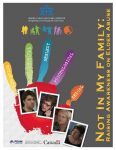World Elder Abuse Awareness Day will be marked with a community-wide event hosted by Jewish Family Services, in partnership with many other agencies. (photo from nvrc.ca)
According to a World Health Organization study, half the world’s population bears a prejudice against the elderly. Jewish Family Services in Vancouver, which shares that statistic on its website, notes that roughly 17% of people over the age of 60 worldwide are victims of elder abuse. The agency also notes that about 20% of Canadians believe older people are a burden on society, and that approximately 80% of Canadian seniors report discrimination in health care.
On June 15, at 10 a.m., JFS will host a free community-wide event in recognition of World Elder Abuse Awareness Day (WEAAD) in the Jewish Community Centre of Greater Vancouver’s Wosk Auditorium. Rights Don’t Get Old: Let’s Unite Against Elder Abuse will cover what can be done to prevent – what many recent studies have shown to be – a growing problem. Featured speakers include Michael Lee, MLA for Vancouver-Langara and shadow minister for Indigenous relations and reconciliation; Isobel McKenzie, British Columbia’s seniors advocate; and Linda Youk of Seniors First BC.
“A very important element of elder abuse is that it can happen to anyone,” said Cindy McMillan, director of programs and community partnerships at JFS. “We shouldn’t make assumptions about who is at risk and who is not. Awareness that it exists, and that there are supports out there … is what June 15 is all about.”
For JFS, “a nonprofit that supports up to 1,200 seniors annually to live at home safely and with dignity, elder abuse prevention, detection and response is an essential part of support,” she said. “This year, following several years of COVID, and subsequent isolation of many older adults, I felt it was very timely to bring the community together to create more awareness around this issue.”
Elder abuse comprises varying forms of mistreatment, the most commonly reported being neglect, followed by emotional and financial abuse. Physical abuse is also prevalent, with 8.8% of abused seniors experiencing physical violence, according to data provided by JFS. Elder abuse can occur in numerous settings, including within the home, at care facilities and in the community. Most reported cases involve family members, with adult children and spouses being the most common perpetrators.
A Statistics Canada report released in 2019 stated that nearly one in five seniors had experienced some form of abuse. A report from the Office of the Seniors Advocate in British Columbia, using data from 2017 to 2021, found a 49% increase in neglect and self-neglect, an 87% increase in reported physical abuse and a 49% increase in financial abuse over that five-year period.
Neglect is often underreported, both because of a lack of awareness as to what constitutes neglect and the potential stigma associated with the admission of neglect, explained McMillan. Neglect can manifest in different ways, such as providing insufficient food and water, failing to administer medication, leaving an older adult in dirty and unsafe living conditions, and not seeking medical attention for the elderly person when it is needed.
Financial abuse, or the exploitation of older adults for monetary gain, can have serious ramifications. Despite numerous laws in place to prevent it, B.C. seniors lose an estimated $50 million annually because of financial abuse, with only one in five cases reported.
WEAAD was launched in 2006 by the International Network for the Prevention of Elder Abuse and the World Health Organization at the United Nations.
“JFS has always been involved in WEAAD, primarily through our Better at Home program, where we have partnered with different community organizations to have smaller events that promote awareness,” said McMillan. “Our involvement stems from our connection with the Marpole Community Response Network, who is at the forefront of providing information and education on elder abuse.”
Better at Home is a JFS-coordinated program, administered by the United Way, which helps seniors in Kerrisdale, Oakridge, Marpole, Southlands and Dunbar with non-medical, day-to-day tasks such as housekeeping, transportation, grocery shopping, visits and handyperson repairs. The program’s objective is to assist seniors so that they can continue to live independently in their own homes and remain connected to their communities.
This year’s June 15 event will have numerous resource tables located in the atrium of the JCC. Among the groups presenting are the Alzheimer Society of British Columbia, JQT Vancouver, Kerrisdale Oakridge Marpole Community Policing Centre, L’Chaim Adult Day Centre, ASK Friendship Society and ReAct Adult Protection Program of Vancouver Coastal Health.
In a statement to the Independent, JFS said it “was very grateful to have partners like the Jewish Federation, the JCC, the Better at Home Program and Seniors First BC coming together to put on such an important event.”
To register for Rights Don’t Get Old: Let’s Unite Against Elder Abuse, visit jfsvancouver.ca. Refreshments will be provided.
Sam Margolis has written for the Globe and Mail, the National Post, UPI and MSNBC.


